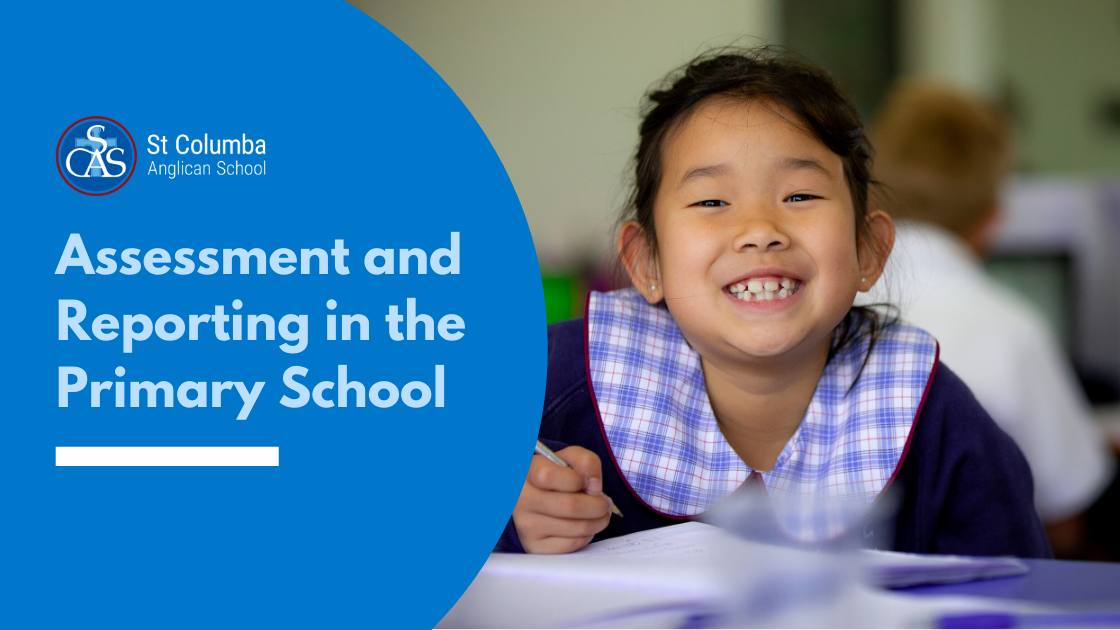
Stephanie Cairns, our Co-ordinator of Literacy and Numeracy K-12, and has taken on a broader role this year incorporating Data and Reporting management in the Primary School. Here she explains the process of Assessment and Reporting for our Primary School students in 2020.
Schools often spend a lot of time using buzzwords such as assessment, educational data, reporting. We sometimes forget that the meaning or usage of these words have changed over time.
What is assessment?
Assessment is more than simply sitting a test or examination. There’s been a lot of talk about assessment in educational settings over the last few years. Educators often talk about assessment for learning, assessment as learning and assessment of learning. There are subtle differences in the purpose of these assessments, and therefore, in what the assessment may look like.
Assessment for Learning
This type of assessment looks at the learner’s knowledge and where the learner needs to be and aims to bridge that gap. This flow diagram, taken from Cambridge Assessment, shows this concept well.

The NSW Education Standards Authority (NESA) defines assessment for learning as “teachers using evidence about students’ knowledge, understanding and skills to inform their teaching…it usually occurs throughout the teaching and learning process to clarify student learning and understanding.”For more interesting information about assessment for learning can be found here.
Assessment as Learning
This type of assessment allows students to be their own assessors – they can take responsibility for their own learning, monitor their own progress, ask questions, and use their assessment information for new learning. It involves students and teachers working together to create goals for learning.
Assessment of Learning
Assessment of learning is what we are more commonly used to seeing in a formalised setting. Evidence of student learning is compared to outcomes, and it occurs throughout the year at set times (perhaps a set time in the term or after a unit is completed). Students may be given grades and feedback for future learning goals.
At SCAS, we use a range of these assessments, for a range of purposes and needs. Evidence of learning can occur in many ways – discussions within a class or a small group, one-to-one interviews, book or classwork, or tests, to name a few.
What educational data do you use at SCAS?
We use a variety of data in the Primary School. We have data from standardised testing and also look at the National Literacy and Numeracy Progressions, which allow us to help set goals for students. We also use student work samples, class discussions and other teaching and learning activities to gauge a student’s knowledge, skills and understanding.
What is Progressive Reporting?
Research has shown that it is important for students to receive feedback about their work – what went well, and what can be improved upon. We know that it can be overwhelming for students to receive huge amounts of feedback at one time.
Progressive reporting is a way for teachers to give caregivers information about how their child is progressing. As such, progressive reporting in 2020 will be released to parents regularly over a semester and will give parents a chance to see an example of their child’s work with some feedback from the teacher, and a goal about where to go next. This is a chance for parents to see their child’s progress over the year, in three key areas. This is designed to show progress, not attainment. This means that there won’t be marks or grades attached to these reports, but more personalised feedback for each child.
What can I expect to see?
You will receive a sample of your child’s work in the areas of writing, reading and numeracy (quantifying number, understanding place value). These will be annotated by the teacher with something that your child did well, and a learning goal—a logical “next step”—for the future. Progressive reports on these three areas will be released three times a semester, so you will be able to see the progress made by your child throughout the year.

Outcomes, areas of strength and target areas for improvement will appear on your child’s Semester report.
We are excited about these changes, as it will allow parents to regularly see a snapshot of their child’s work and see their learning goals and the progress made.
 | Mrs Stephanie Cairns Coordinator of Literacy and Numeracy K-12 St Columba Anglican School |

